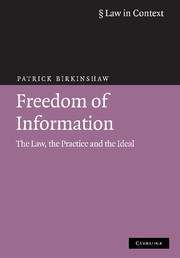Book contents
- Frontmatter
- Contents
- Preface
- Table of statutes
- Table of cases
- Introduction
- 1 Persistent themes and novel problems
- 2 Information and national security
- 3 Government and information: a historical development
- 4 The Freedom of Information Act 2000
- 5 The exemptions
- 6 Decisions and Appeals on FOI Exemptions
- 7 Access to environmental information
- 8 Privacy, access and data protection
- 9 Claims and counterclaims
- 10 Secrecy and access in the European Union
- 11 Openness, information and the courts
- 12 Freedom of information: overseas experience
- 13 Conclusion
- Index
6 - Decisions and Appeals on FOI Exemptions
Published online by Cambridge University Press: 05 June 2012
- Frontmatter
- Contents
- Preface
- Table of statutes
- Table of cases
- Introduction
- 1 Persistent themes and novel problems
- 2 Information and national security
- 3 Government and information: a historical development
- 4 The Freedom of Information Act 2000
- 5 The exemptions
- 6 Decisions and Appeals on FOI Exemptions
- 7 Access to environmental information
- 8 Privacy, access and data protection
- 9 Claims and counterclaims
- 10 Secrecy and access in the European Union
- 11 Openness, information and the courts
- 12 Freedom of information: overseas experience
- 13 Conclusion
- Index
Summary
‘The Act contains a presumption in favour of disclosure.’
(EA/2005/0027 P. Toms v IC, para. 2)The previous chapter set out the general framework of the Freedom of Information Act (FOIA) statutory exemptions and related items including some general points addressed in the case law. This chapter will concentrate on the case law of the exemptions themselves under FOIA. The Environmental Information Regulations (EIR) are dealt with in chapter 7. Excessive cost and vexatious requests have been dealt with and so we can proceed directly to the main body of exemptions under FOIA Pt II.
Those contracting with public authorities (PAs) that are covered by the legislation may attempt to contract out of the legislation's provisions. This is not possible. In EA/2007 R. Salmon v IC and King's College Cambridge the Information Tribunal (IT) stated ‘that no contracting out of basic obligations safeguarded by FOIA can be permissible’ (para. 30). This was given the strongest of support by the High Court in Corporate Officer of the House of Commons v IC et al. A contractor may attempt to identify information which is ‘confidential’ in a schedule and argue that disclosure by a PA would amount to a breach of contract. Such a schedule would in genuine cases of confidentiality be a wise practice.
- Type
- Chapter
- Information
- Freedom of InformationThe Law, the Practice and the Ideal, pp. 181 - 244Publisher: Cambridge University PressPrint publication year: 2010



